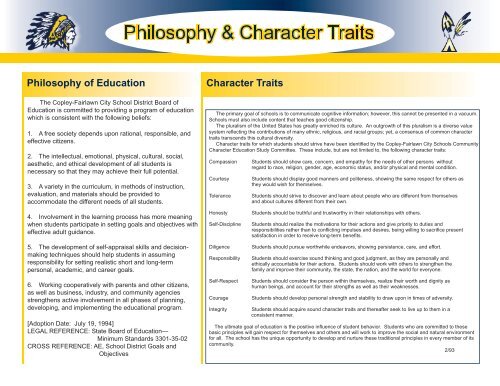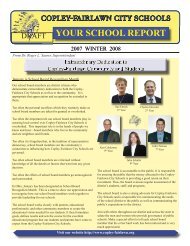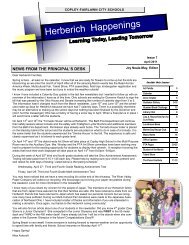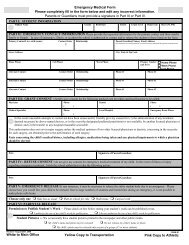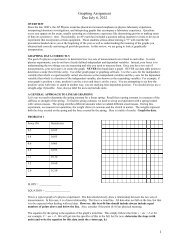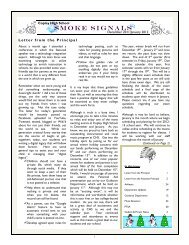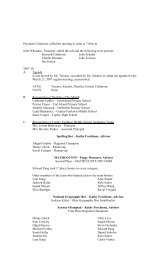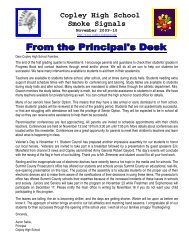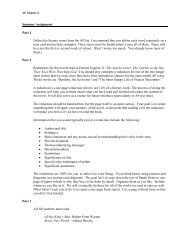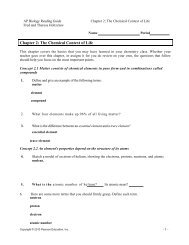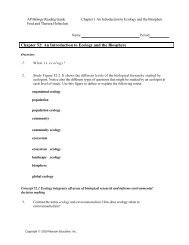2013 District Activity Calendar - Copley-Fairlawn City Schools
2013 District Activity Calendar - Copley-Fairlawn City Schools
2013 District Activity Calendar - Copley-Fairlawn City Schools
Create successful ePaper yourself
Turn your PDF publications into a flip-book with our unique Google optimized e-Paper software.
Philosophy of Education<br />
The <strong>Copley</strong>-<strong>Fairlawn</strong> <strong>City</strong> School <strong>District</strong> Board of<br />
Education is committed to providing a program of education<br />
which is consistent with the following beliefs:<br />
1. A free society depends upon rational, responsible, and<br />
effective citizens.<br />
2. The intellectual, emotional, physical, cultural, social,<br />
aesthetic, and ethical development of all students is<br />
necessary so that they may achieve their full potential.<br />
3. A variety in the curriculum, in methods of instruction,<br />
evaluation, and materials should be provided to<br />
accommodate the different needs of all students.<br />
Character Traits<br />
The primary goal of schools is to communicate cognitive information; however, this cannot be presented in a vacuum.<br />
<strong>Schools</strong> must also include content that teaches good citizenship.<br />
The pluralism of the United States has greatly enriched its culture. An outgrowth of this pluralism is a diverse value<br />
system refl ecting the contributions of many ethnic, religious, and racial groups; yet, a consensus of common character<br />
traits transcends this cultural diversity.<br />
Character traits for which students should strive have been identifi ed by the <strong>Copley</strong>-<strong>Fairlawn</strong> <strong>City</strong> <strong>Schools</strong> Community<br />
Character Education Study Committee. These include, but are not limited to, the following character traits:<br />
Compassion Students should show care, concern, and empathy for the needs of other persons without<br />
regard to race, religion, gender, age, economic status, and/or physical and mental condition.<br />
Courtesy Students should display good manners and politeness, showing the same respect for others as<br />
they would wish for themselves.<br />
Tolerance Students should strive to discover and learn about people who are different from themselves<br />
and about cultures different from their own.<br />
4. Involvement in the learning process has more meaning<br />
when students participate in setting goals and objectives with<br />
effective adult guidance.<br />
5. The development of self-appraisal skills and decisionmaking<br />
techniques should help students in assuming<br />
responsibility for setting realistic short and long-term<br />
personal, academic, and career goals.<br />
Honesty<br />
Self-Discipline<br />
Diligence<br />
Responsibility<br />
Students should be truthful and trustworthy in their relationships with others.<br />
Students should realize the motivations for their actions and give priority to duties and<br />
responsibilities rather than to confl icting impulses and desires, being willing to sacrifi ce present<br />
satisfaction in order to receive long-term benefi ts.<br />
Students should pursue worthwhile endeavors, showing persistence, care, and effort.<br />
Students should exercise sound thinking and good judgment, as they are personally and<br />
ethically accountable for their actions. Students should work with others to strengthen the<br />
family and improve their community, the state, the nation, and the world for everyone.<br />
6. Working cooperatively with parents and other citizens,<br />
as well as business, industry, and community agencies<br />
strengthens active involvement in all phases of planning,<br />
developing, and implementing the educational program.<br />
[Adoption Date: July 19, 1994]<br />
LEGAL REFERENCE: State Board of Education—<br />
Minimum Standards 3301-35-02<br />
CROSS REFERENCE: AE, School <strong>District</strong> Goals and<br />
Objectives<br />
Self-Respect<br />
Students should consider the person within themselves, realize their worth and dignity as<br />
human beings, and account for their strengths as well as their weaknesses.<br />
Courage Students should develop personal strength and stability to draw upon in times of adversity.<br />
Integrity Students should acquire sound character traits and thereafter seek to live up to them in a<br />
consistent manner.<br />
The ultimate goal of education is the positive infl uence of student behavior. Students who are committed to these<br />
basic principles will gain respect for themselves and others and will work to improve the social and natural environment<br />
for all. The school has the unique opportunity to develop and nurture these traditional principles in every member of its<br />
community.<br />
2/93


